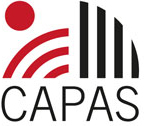Call for Papers
Apocalyptica is an international, interdisciplinary, open-access, double-blind peer-reviewed academic journal published by the Käte Hamburger Centre for Apocalyptic and Post-Apocalyptic Studies (CAPAS) at Heidelberg University.
- Editors: Robert Folger, Felicitas Loest, and Jenny Stümer
- Article length: 8,000-9,000 words
- Deadline: Year-round – 1 September 2024 (for our next issue)
- Contact:publications@capas.uni-heidelberg.de
Apocalyptic Thinking in the Anthropocene
As anthropogenic violence tightens its grip on the world, the notion of apocalypse is gaining traction for a range of cultural and political imaginaries that grapple with the potential and actual upending of worlds in the context of escalating climate emergency, looming nuclear threat, and the ongoing repercussions of colonization, militarization, and racial capitalism. In this context, apocalypse emerges at the fissures between planetary doom and the un/making of specific worlds in such a way that the scales of different catastrophes, ruptures, and their associated revelations can be thought within a common (if assorted) fold of distinct end-time scenarios.
Crucially, while apocalypse has historically been treated as an object of knowledge explicitly tethered to biblical redemption, this ominous and often contested framework of the ‘Anthropocene’ appears to inspire an important reframing of ‘the end of the world’, whereby apocalypse allows for a much broader reconfiguration of the temporal, spatial, and sensible orientations of how we make sense of the various predicaments of our many worlds.
Apocalyptica interrogates these dynamics of world-making and world-breaking through trajectories of what we have termed ‘apocalyptic thinking’ in order to explore how the notion of an end of the world or the many ends of different worlds may open a lens for social, cultural, and political analyses that engage with the various gridlocks that fuel the emergencies of the Anthropocene.
Within this framework, the notion of apocalyptic upheaval is also met (and productively troubled/sometimes also utilized) by new social justice movements, innovative narratives, and storytelling practices that draw on (and simultaneously influence) new socio-economic discourses in an effort to put forward speculative imaginations, deconstructive epistemologies, and novel ways of conceiving ‘the end’. Such ends of the world are then frequently featured in fiction films, TV series, music, art, video games, comics, literature, theatre, photography, etc. While often commenting on the bleak outcomes of the historical present in the light of an ongoing and unjust past, in these views, apocalypses and their envisioned aftermaths (also) produce emancipatory and creative potentials that engage with the possibility of plural worlds, embodied futurities, non-linear temporalities, and radical difference.
We are particularly interested in contributions that critically explore the many layers of ‘apocalyptic thinking’ in these contexts and those that broaden conceptualizations of apocalypse as a lens and framework in the humanities and beyond. We also encourage authors to reflect on the implications of such ‘apocalyptic thinking’ for understandings of methodology, knowledge, and scholarship more broadly.
What are the cultural politics of apocalyptic thinking? What movements, politics, ideas, geographies, sensibilities, stories, and images might be considered (post)apocalyptic or invoke debates and feelings about the end of the/a world? What does the concept of anthropogenic violence do to an understanding of the world, its various endings, and possible aftermaths? How does the notion of apocalypse shift (or substantiate) hegemonic understandings, inevitable interpretations, or false hopes in a purportedly doomed and unpredictable world? What kind of temporalities, spaces, affects, and practices are intimated (or troubled) by the apocalyptic? And in turn, how do present, past, and current endings inspire a rethinking of apocalypse itself? How does apocalypse help us to address escalating global as well as local challenges which (also) articulate the promise of diverse futures and (perhaps) more just, political commons, alternative collectivities, and fuller relationships with each other and the world?
We are seeking original submissions that actively explore apocalyptic thinking (and its associated imaginaries, experiences, practices, forms, aesthetics, genres, affects, fantasies, themes, etc.) in order to unpack these (and other) questions and concerns.
Prospective contributions might examine the apocalypse in relation to the following themes, contexts and media (the list may serve as inspiration):
- De/Colonial apocalypses
- Anti/Epistemologies of the apocalypse
- Race, gender, and sexuality (queer apocalypse, apocalypse as decolonization, feminist apocalypse, anthropogenic whiteness)
- Apocalyptic temporalities (decentered futurisms, experiential histories, alternative memories)
- Cultural imaginaries, narratives, and practices (film, TV, literature, music, comics, video games, art, theatre, photography)
- Apocalypse, genre, and motifs (Sci-Fi, satire, comedy, melodrama, cyberpunk, dystopia and utopia)
- Collective political imaginaries, movements, and activism (indigenous resistance and postcolonial struggles, Black Lives Matter; Extinction Rebellion, Fridays for Future)
- Embodied experiences (viscerality, affect, survival)
- Elemental apocalypse (solar imaginaries, anti-imperial ontologies of water, fire, earth)
- Petrocultures, nuclear necropolitics, and securitization
- Animal studies, ecocriticism, and animacies
- Architecture and landscape (including social relations to the environment, atmospheric knowledge, and climate strategies)
- White supremacy and right-wing politics
- Algorithmic governance and technocolonialism (digital cultures, social media, surveillance)
- Border politics and global mobilities (climate migration, border-walls, ecologies, biopolitics)
- Pandemics and epidemics
- Conceptualizing the ‘end’ of ‘worlds’, rupture, and/or worldmaking
Please submit your article (no longer than 8,000-9,000 words, including an abstract of 250 words and bibliography) as well as a short bio (50 words) by 1 September 2024 to publications@capas.uni-heidelberg.de.
All submissions must use author-date reference style, 12pt font and at least 1.5 line spacing. Please check our style guide prior to submission.
Further Information
- For further Information please contact Jenny Stümer or Michael Dunn: publications@capas.uni-heidelberg.de.
- More about Apocalyptica
- Call for Papers online







